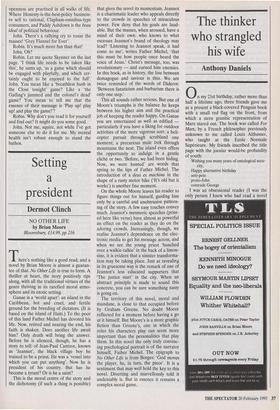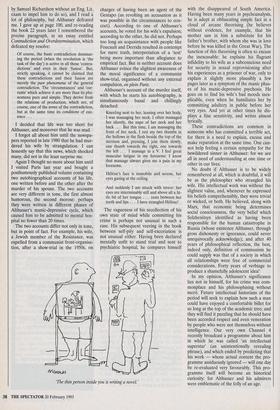The thinker who strangled his wife
Anthony Daniels
On my 21st birthday, rather more than half a lifetime ago, three friends gave me as a present a black-covered Penguin book with a small red flag on the front, from which a stern granitic representation of Marx stared out. The book was called For Marc, by a French philosopher previously unknown to me called Louis Althusser, who taught at the Ecole Normale Sup8rieure. My friends inscribed the title page with the jocular would-be profundity of youth:
Wishing you many years of ontological secu- rity, Happy alternative birthday anti-pete proto-John comrade George
I was an obsessional reader (I was the only person I knew who had read a novel by Samuel Richardson without an Eng. Lit. exam to impel him to do so), and I read a lot of philosophy, but Althusser defeated me. I gave up at page 100, and re-reading the book 22 years later I remembered the precise paragraph, in an essay entitled Contradiction and Overdetermination, which defeated my resolve: Of course, the basic contradiction dominat- ing the period (when the revolution is 'the task of the day') is active in all these 'contra- dictions' and even in their 'fusion'. But, strictly speaking, it cannot be claimed that these contradictions and their fusion are merely the pure phenomena of the general contradiction. The 'circumstances' and 'cur- rents' which achieve it are more than its phe- nomena pure and simple. They derive from the relations of production, which are, of course, one of the terms of the contradiction, but at the same time its conditions of exis- tence . . .
I decided that life was too short for Althusser, and moreover that he was mad.
I forgot all about him until the newspa- pers reported in late 1980 that he had mur- dered his wife by strangulation. I can honestly say that this news, which shocked many, did not in the least surprise me.
Again I thought no more about him until I visited Paris last year and bought a posthumously published volume containing two autobiographical accounts of his life, one written before and the other after the murder of his spouse. The two accounts are very different in tone, the first almost humorous, the second morose: perhaps they were written in different phases of Althusser's manic-depressive cycle, which caused him to be admitted to mental hos- pital no fewer than 20 times.
The two accounts differ not only in tone, but in point of fact. For exampie, his wife, a Jewish member of the Resistance, was expelled from a communist front-organisa- tion, after a show-trial in the 1950s, on
charges of having been an agent of the Gestapo (as revolting an accusation as it was possible in the circumstances to con- coct). According to one of Althusser's accounts, he voted for his wife's expulsion; according to the other, he did not. Perhaps too long an acquaintance with people like Foucault and Derrida resulted in contempt for mere truth, interpretation of a 'text' being more important than allegiance to empirical fact. But in neither account does Althusser evince the slightest awareness of the moral significance of a communist show-trial, organised without any external compulsion, en plein Paris.
Althusser's account of the murder itself, with which he starts his autobiography, is simultaneously banal and chillingly detached:
Kneeling next to her, leaning over her body, I was massaging her neck. I often massaged her silently, the nape of her neck and her back . . . But this time, I am massaging the front of her neck. I rest my two thumbs in the hollows in the flesh beside the top of the sternum and, pressing, I join them slowly, one thumb towards the right, one towards the left . I massage in a V. I feel great muscular fatigue in my forearms: I know that massage always gives me a pain in my forearms.
Helene's face is immobile and serene, her eyes gazing at the ceiling.
And suddenly I am struck with terror: her eyes are interminably still and above all a lit- tle bit of her tongue . rests between her teeth and lips . . I have strangled Helene!
The vagueness of his recollection of his own state of mind while committing his crime is perhaps not unusual in such a case. His subsequent veering in the book between self-pity and self-excoriation is not unusual either. Having been declared mentally unfit to stand trial and sent to psychiatric hospital, he compares himself The thin person inside you is writing a novel.' with the disappeared of South America. Having been many years in psychoanalysis, he is adept at obfuscating simple fact in a cloud of arcane theorising (he believes without evidence, for example, that his mother saw in him a substitute for his father's brother, with whom she was in love before he was killed in the Great War). The function of this theorising is often to excuse the inexcusable: he explains his flagrant infidelity to his wife as a subconscious need for security in sexual reprovisioning after his experiences as a prisoner of war, only to explain it slightly more plausibly a few pages later as a symptom of the manic phas- es of his manic-depressive psychosis. He goes on to find his wife's bad moods inex- plicable, even when he humiliates her by committing adultery in public before her very eyes. And yet at other times he dis- plays a fine sensitivity, and writes almost lyrically.
These contradictions are common in someone who has committed a terrible act, for there is a need to explain, excuse and make reparation at the same time. One can- not help feeling a certain sympathy for the bewildered sinner in Althusser: for we are all in need of understanding at one time or other in our lives.
No doubt if Althusser is to be widely remembered at all, which is doubtful, it will be as the philosopher who strangled his wife. His intellectual work was without the slightest value, and, whenever he expressed his beliefs comprehensibly, they were trivial or wicked, or both. He believed, along with Marx, that economic being determines social consciousness, the very belief which Solzhenitsyn identified as having been responsible for the human catastrophe in Russia (whose existence Althusser, through gross dishonesty or ignorance, could never unequivocally acknowledge); and after 40 years of philosophical reflection, the best, indeed only, definition of communism he could supply was that of a society in which all relationships were free of commercial considerations. Forty years of verbiage to produce a shamefully adolescent idea!
In my opinion, Althusser's significance lies not in himself, for his crime was com- monplace and his philosophising without merit. Future intellectual historians of the period will seek to explain how such a man could have enjoyed a comfortable billet for so long at the top of the academic tree; and they will find it puzzling that he should have been accorded respect and even veneration by people who were not themselves without intelligence. Our very own Channel 4 recently broadcast a programme about him in which he was called 'an intellectual superstar' (an unintentionally revealing phrase), and which ended by predicting that his work — whose actual content the pro- gramme assiduously ignored — will one day be re-evaluated very favourably. This pro- gramme itself will become an historical curiosity: for Althusser and his admirers were emblematic of the folly of an age.



























































 Previous page
Previous page